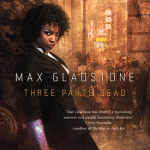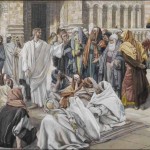Chris Hallquist (who blogs in the Patheos Atheist channel as the Uncredible Hallq) is in the process of writing a book tentatively titled Angry Atheists?: Why the Backlash Against Popular Atheism Is Silly. As he writes it, he’s posting drafts of chapters on his blog to invite comment, sort out confusion, etc. The most recent chapter he’s revised and posted is to be Chapter Two: The many gods I don’t believe in (yours included).
Since I guess I’m in the intended audience for the eventual book, I want to riff on a few things, but I’m not trying to have a full blown debate with a work in progress, and if commenters pop over to Chris’s, I’d prefer you refrain, too. I’m just trying to hit things that stuck out to me like (Are you going to come back to this in more detail in a different chapter? I disagree with your characterization of X, should the reasoning for it be expanded?). Then it’s up to Chris to decide if addressing my questions is likely to be helpful to the readers he’s writing for. (Which they may not be! Use more math and musical theatre analogies is a note I might be tempted to give, but not one that anyone has to listen to).
In this chapter, Chris is heading off the sometimes valid Courtier’s Reply off at the pass.
I am not an expert in theology. Most atheists aren’t. Richard Dawkins isn’t, Sam Harris isn’t, Daniel Dennett isn’t. In this chapter, though, I’m going to show that I know enough about other people’s beliefs to know what I’m rejecting when I reject the idea of gods. And I’ll show that Dawkins is actually a more reliable source of information about theology than some of the people who accuse him of being theologically ignorant.
Reading over the chapter, I don’t disagree with Chris that some of the apologists that he’s citing are at least as bad as Dawkins at theology, if not worse. He leans heavily in this chapter on the fundamentalists at one end and the loosey-goosey to the point of incoherence folks on the other. (Martin Garnder’s semi-novel, semi-memoir The Flight of Peter Fromm is a nice illustration of how diluting the faith really isn’t the same thing as defending it). I think a lot of his arguments here are totally valid, but, before I can say, “But you’re not addressing my tradition!” Chris has anticipated my response:
Unfortunately, while I’m sure you think your version of religion is the true one, so does every other religious person on the planet, most of whom disagree with you. As an atheist, I have no reason to accept your version of religion as “true religion” while ignoring other people’s version. And I can’t go to “the experts” (meaning theologians) to find out what “true religion” is because theologians don’t agree either.
This is one way theology is different than science. If someone is going to attack the theory of evolution, it’s reasonable to ask they deal with the form of the theory modern scientists actually accept, because scientists mostly agree on what the best current form of the theory of evolution is. You will find no such agreement among theologians.
Here’s my problem with this defense. First of all, it’s clear that Chris and others might have a rank ordering of apologists in mind of most ridiculous to least, even if all are false. There’s no guarantee that the most reasonable sounding folks are right, but that might be a useful metric for trying to figure out which experts it’s worth your time to cross examine.
In fairness to Chris, an atheist should pick different experts to examine and rebut depending on what his/her goals are. If you’re in the middle of an exploration (whether because you’re feeling a little agnostic or just because you’re trying to get your due diligence credentials), you want to talk to the people who seem the most likely to be right. If you’re pretty sure of your answers, and you’re writing for harm reduction, it’s reasonable to pick the most influential apologists, even if their arguments aren’t particularly compelling or challenging to you. Someone has to deprogram the Randroids, even if it’s not as intellectually fruitful for a liberal as taking on the team at AmCon.
But, in the blockquote, Chris is talking about finding the hypothetical real experts, and says he has no way to sift out better claims from worse. I think he’s saying that no theology pays rent, so there aren’t any possibly true predictions to test. Scientific models can be more or less accurate, and we can check by experiment; but religion can’t have experts (except in the historical trivia sense), since theologians aren’t modeling anything real to check their explanations against.
This sounds like Chris is begging the question. If he doesn’t have a duty to check whether religion could be true with experts because there are no experts because there’s nothing to be expert about because religion is false. The claim that’s being contested is whether religion does model the world accurately and whether its models account for something the purely naturalistic models of, say, Alex Rosenberg, can’t accommodate.
This problem doesn’t necessarily belong in this chapter, and Chris may be planning to address it elsewhere, but I think if he tosses off the no-experts claim without reference to a later discussion, Christians like me will be a little miffed and distracted from whatever point follows. Besides, the question of how a novice is supposed to be able to spot an adept is a cool one!

















